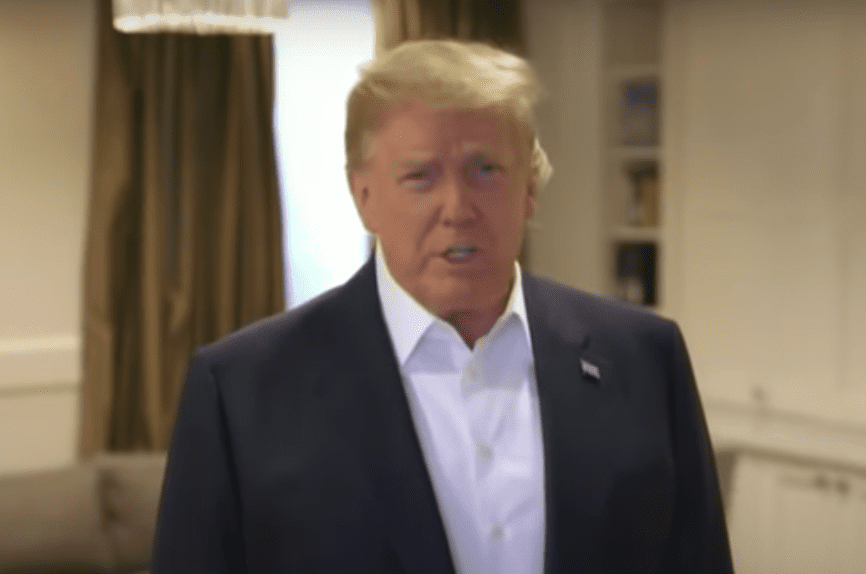Trump’s Covid Debacle

The Lincoln Project people can’t stand Donald Trump. Still, this is a powerful ad, because unfortunately, it’s true:
Trump’s COVID-19 Timeline pic.twitter.com/IUDBSOJSA3
— The Lincoln Project (@ProjectLincoln) October 5, 2020
The president’s handling of his Covid diagnosis has been extraordinarily irresponsible, even for him. All those people he exposed — now many of them are getting sick. The recklessness of this is staggering. A former Republican political strategist I know said none of this makes political sense to him. It is, he said, “gross incompetence.”
I don’t believe it is fair to blame Donald Trump entirely for this country’s botched response to Covid. David Brooks has a powerful essay just out in The Atlantic, about the collapse in social trust as at the core of this broad crisis in American life. I’m going to write about the essay later, but let me quote this part for now:
In March and April, vast majorities of Americans said they supported social distancing, and society seemed to be coming together. It didn’t last. Americans locked down a bit in early March, but never as much as people in some other countries. By mid-April, they told themselves—and pollsters—that they were still socially distancing, but that was increasingly a self-deception. While pretending to be rigorous, people relaxed and started going out. It was like watching somebody gradually give up on a diet. There wasn’t a big moment of capitulation, just an extra chocolate bar here, a bagel there, a scoop of ice cream before bed. By May, most people had become less strict about quarantining. Many states officially opened up in June when infection rates were still much higher than in countries that had successfully contained the disease. On June 20, 500,000 people went to reopened bars and nightspots in Los Angeles County alone.
You can blame Trump or governors or whomever you like, but in reality this was a mass moral failure of Republicans and Democrats and independents alike. This was a failure of social solidarity, a failure to look out for each other.
Alexis de Tocqueville discussed a concept called the social body. Americans were clearly individualistic, he observed, but they shared common ideas and common values, and could, when needed, produce common action. They could form a social body. Over time, those common values eroded, and were replaced by a value system that put personal freedom above every other value. When Americans were confronted with the extremely hard task of locking down for months without any of the collective resources that would have made it easier—habits of deference to group needs; a dense network of community bonds to help hold each other accountable; a history of trust that if you do the right thing, others will too; preexisting patterns of cooperation; a sense of shame if you deviate from the group—they couldn’t do it. America failed.
We did. But it’s human nature to look for a scapegoat, and Trump fits the bill. If you were determined to reinforce people’s fears that you, as president, are responsible for screwing up the federal response to this plague that has killed over 200,000 of us, you would behave exactly as Donald Trump has behaved in this last week.
Why did he do the things he did, even though it would have been very easy for him to have done otherwise, and would have cost him nothing? Who knows? Who ever knows with this guy? The impression he leaves by his actions is that everything revolves around him, and the health and welfare of the people who serve him, and who support him (donors) do not matter. How would you feel if that were you working in the White House, or your husband, or your daughter? How would you feel if you were one of the elderly donors that met with an infected Trump at the Bedminster golf course?
I have mentioned in this space — and I write about in Live Not By Lies — how the Imperial Russian government’s botched handling of the 1891-92 famine was a key turning point in the Russian Revolution of 1917. Why? Because it badly shook the confidence of the Russian people in their government’s competence. Marxist radicals never really got much traction with the broader Russian public until the famine debacle made people wonder if the system really could be counted on to keep them safe. People began to wonder if maybe the radicals were onto something in their critique of the regime. The Tsarist establishment lost a great amount of credibility with the public, and never, of course, got it back.
Trump’s failures on Covid, epitomized by his own failure to manage his exposure with regard to White House staffers and supporters, come at a time of historic loss of public faith in institutions. As Brooks writes in his detailed essay, we are living in an era of great insecurity because of this loss of trust — and Millennials and Generation Z are the most dramatically affected by it. Again, I’m going to explore this in a separate post, but the things Brooks talks about regarding the fear, anxiety, and eagerness for protection running rampant among Millennials and Gen Z are exactly the things that Hannah Arendt observed as present in pre-totalitarian Russia and Germany.
What Trump has done with his own Covid diagnosis is a monumental act of self-sabotage. What he is helping to sabotage is more than his own administration and re-election campaign, I fear.